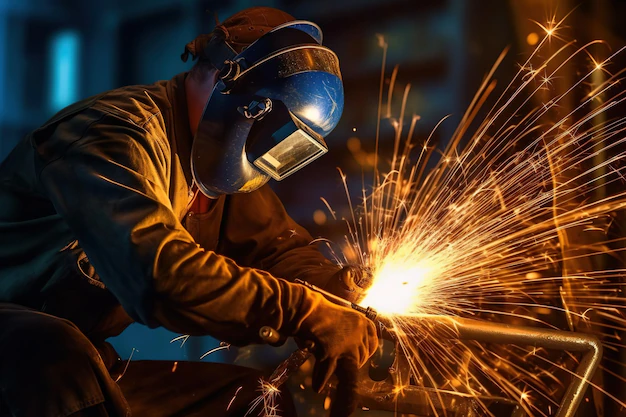How Many Hours Do Welders Work? Facts and Figures 2023

Introduction
How Many Hours Do Welders Work? Facts and Figures”2023! Welders play a crucial role in various industries, using their skills to join and fabricate metal parts. Their work is essential in construction, manufacturing, and other sectors where metalwork is involved. If you’re considering a career in welding or are simply curious about the field, it’s important to understand the typical work hours that welders work. In this article, we will delve into the world of welding and shed light on the various factors that influence a welder’s work schedule.
1. Typical Work Hours for Welders
Welders generally adhere to standard work hours, although there can be some variations depending on the specific job and industry. How Many Hours Do Welders Work? A typical workweek for welders consists of 40 hours, with 8-hour shifts from Monday to Friday. However, it’s important to note that welding work hours can be influenced by several factors.
2. Full-Time and Part-Time Employment
How Many Hours Do Welders Work? Welders can find opportunities for both full-time and part-time How Many Hours Do Welders Work? Full-time positions provide stability and a regular work schedule, allowing welders to plan their lives accordingly. On the other hand, part-time positions can offer flexibility and may be suitable for those seeking alternative work arrangements or pursuing additional interests alongside their welding career.
3. Shift Work and Overtime
In certain industries, such as manufacturing or construction, welders may be required to work in shifts. How Many Hours Do Welders Work? Shift work involves working outside the typical 9-to-5 schedule, with different teams covering various time slots. This allows companies to maintain continuous operations, particularly in industries that require round-the-clock production how Many Hours Do Welders Work?
Additionally, welders may encounter situations that require overtime work. Overtime typically refers to working additional hours beyond the standard workweek, How Many Hours Do Welders Work? Usually exceeding 40 hours. To achieve project deadlines, respond to emergencies, or control unanticipated workload increases, overtime may be required. It’s important to note that overtime may be subject to legal regulations and eligibility for additional compensation
4. Flexible Work Arrangements
In recent years, flexible work arrangements have gained popularity in various industries, including welding. These arrangements offer alternatives to traditional fixed schedules and allow welders to have more control over their work hours. How Many Hours Do Welders Work? For example, some companies offer compressed workweeks, where employees work longer hours per day but have more days off in return. Others may provide opportunities for remote work, enabling welders to work from home or other locations.
the Benefits of flexible work arrangements include better work-life balance, shorter commutes, and more flexibility for personal commitments. However, they may not be available in all companies or industries, and eligibility for such arrangements may depend on job requirements and company policies.
5. Seasonal and Project-Based Work
Welders may encounter seasonal or project-based employment opportunities, particularly in certain industries. How Many Hours Do Welders Work Seasonal work refers to jobs that are only available during specific times of the year, such as construction projects that are more active during the summer months. Project-based work, on the other hand, involves working on specific assignments or contracts that have a defined duration.
Seasonal and project-based work can introduce fluctuations in a welder’s work hours. During peak seasons or project-intensive periods, welders may experience longer work hours and tight deadlines. Conversely, there may be periods of reduced work or downtime between projects, where work hours may be limited.
6. Factors Influencing Work Hours
Several factors can counter seasonal or project-based employment opportunities, particularly in certain industries. How Many Hours Do Welders Work Seasonal work refers to jobs that are only available during specific times of the year, such as construction projects that are more active during the summer months. Location plays a significant role, as work schedules can vary between countries, regions, and even cities. Local labor laws and industry norms can dictate the maximum number of hours that can be worked in a day or week, as well as overtime regulations and compensation.
Industry type also affects work hours. How Many Hours Do Welders WorkFor instance, welders in construction may have different schedules compared to those in shipbuilding or manufacturing? Construction welders often work on-site and may be subject to weather conditions and project timelines. Shipbuilding welders may work in a controlled environment but may have to adhere to specific shipbuilding schedules. Manufacturing welders may work in large facilities with continuous production lines, necessitating round-the-clock operations.
Company policies and workload also play a role. Some companies may have strict schedules and adherence to regular working hours, while others may have more flexibility. Workload fluctuations, client demands, or urgent projects can also impact a welder’s work hours, leading to overtime or extended shifts.
6.1 Welders’ Work-Life Balance
Welders must maintain a positive work-life balance in order to maintain their general happiness and well-being.
How Many Hours Do Welders Work? Long work hours or irregular schedules can potentially disrupt personal life and relationships. It’s crucial for welders to find ways to manage their work hours effectively while making time for rest, relaxation, and personal activities.
A better work-life balance can be achieved by setting boundaries between work and personal life, placing a high priority on self-care, and asking friends and family for help. It’s also beneficial to communicate openly with employers about work hour preferences and explore available options for flexibility whenever possible.
6.2 Work hours’ effects on health and wellbeing
The health and well-being of welders can be significantly impacted by long work hours and unpredictable scheduling. How Many Hours Do Welders Work?
Prolonged exposure to physically demanding work, coupled with extended work hours, can lead to fatigue, stress, and increased risk of injuries. Insufficient rest and recovery time can also contribute to mental and emotional exhaustion.
To mitigate these risks, welders should prioritize adequate sleep, engage in regular exercise, and practice stress management techniques. Taking breaks during work hours and utilizing proper safety measures can help prevent accidents and promote overall well-being. Additionally, seeking support from healthcare professionals and accessing employee assistance programs can provide resources for managing work-related health challenges.
Industry-Specific Considerations
How Many Hours Do Welders Work? Work hours in the welding profession can vary based on the specific industry. In the construction sector, welders may work on-site during the day, aligning their schedules with other construction activities. Manufacturing industries often operate in shifts, allowing for continuous production. Shipbuilding may involve longer work hours during crucial phases of vessel construction.
Each industry presents its unique challenges and opportunities when it comes to work hours. Welders should familiarize themselves with the requirements and expectations of their chosen industry to effectively manage their schedules and plan for career advancement.
Career Advancement and Work Hours
How Many Hours Do Welders Work? As welders progress in their careers, Worktheir work hours may evolve. Advancement opportunities often lead to supervisory or managerial roles, which may involve different work schedules. Supervisors may work regular daytime hours overseeing welding operations, while managers may have more flexible schedules to accommodate responsibilities such as project planning and coordination.
It’s important for welders to consider the potential changes in work hours as they pursue career growth. Discussing career goals and work hour preferences with supervisors and mentors can help align aspirations with suitable positions.
Future Trends and Innovations
The welding industry is not immune to technological advancements and evolving trends. Automation and robotics are increasingly being incorporated into welding processes, leading to improvements in efficiency and productivity. While these advancements have the potential to change the nature of welding work, it’s essential to note that they may also impact work hours.
As automation becomes more prevalent, certain tasks may be delegated to machines, resulting in a shift in the type of work performed by welders. This shift could potentially influence work-hour requirements and create opportunities for more specialized roles. Staying informed about emerging trends and technological advancements can help welders adapt to the changing landscape of the industry.
Conclusion
Understanding the work hours of welders is crucial for individuals considering a career in welding and for those already working in the field. How Many Hours Do Welders Work? While the typical workweek for welders consists of 40 hours, factors such as industry type, company policies, project demands, and geographic location can influence work schedules. It’s important for welders to prioritize work-life balance, take steps to manage their health and well-being, and stay informed about industry-specific considerations and future trends. By doing so, welders can navigate their careers and optimize their work hours for a fulfilling and successful professional journey
FAQs
Are all welders required to work night shifts?
No, not all welders are required to work night shifts. How Many Hours Do Welders Work? Work hours vary based on industry, company policies, and specific job requirements.
Can welders choose flexible work arrangements?
Flexible work arrangements depend on the company and industry. While some companies offer flexible options, it may not be universally available.
Do welders always have to work overtime?
Overtime requirements vary based on workload, project demands, and legal regulations. Not all welders are required to work overtime, but it can occur during peak periods or urgent situations.






